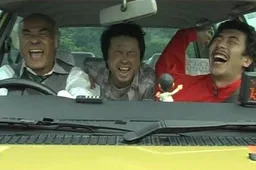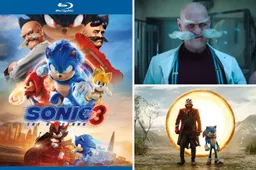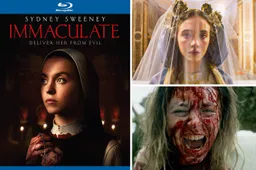The Higher Force is one of those movies at the International Film festival Rotterdam that will make you leave the movie theatre with a big smile upon your face. An Icelandic Mafia movie that makes Gomorra look like a box full of puppies. MovieSense spoke to director Olaf de Fleur Johannesson and writer Thorvaldur Thorsteinsson. "Avoid quoting us, and don’t make any eye contact."

Olaf de Fleur Johannesson
Where do you get the inspiration to make movies like these?
Olaf: I am of the VHS generation, so I think in pictures. The generation before was more the literature type. My generation can think in pictures and scenes. In terms of inspiration, I don’t know…I just trust that something will come out of it. What I always try is to demystify film, especially when you are poor. The search for simplicity. You think about what you really need to make a film, what have all films in common. They have scenes. In each scene you have usually a location, a character or characters who something have the tendency to speak to each other. You tape it on with a film camera, put it on the computer, edit it and other people will believe it is a film. This is how it basically works. So this is all the magic. I use my trust and guts. Subjects for my films have just come to me by coincidence. What also helps is I try not to care if I make any mistakes. The only risk that I try to avoid is the financial one. Because if you are bankrupt, it will be difficult to do your next film.
Olaf: I am of the VHS generation, so I think in pictures. The generation before was more the literature type. My generation can think in pictures and scenes. In terms of inspiration, I don’t know…I just trust that something will come out of it. What I always try is to demystify film, especially when you are poor. The search for simplicity. You think about what you really need to make a film, what have all films in common. They have scenes. In each scene you have usually a location, a character or characters who something have the tendency to speak to each other. You tape it on with a film camera, put it on the computer, edit it and other people will believe it is a film. This is how it basically works. So this is all the magic. I use my trust and guts. Subjects for my films have just come to me by coincidence. What also helps is I try not to care if I make any mistakes. The only risk that I try to avoid is the financial one. Because if you are bankrupt, it will be difficult to do your next film.
We’re there any difficulties during the production of the The Higher Force?
Olaf: Not really, though I was just generally stressed. When all these people are giving you attention, you begin to think that you are really somebody and then you become stressed. The shoot was 40 days. After about 20 days I stopped being stressed and I just was sort of careless with it, but you know when you are careless you also will be much more able to be focused. It is a paradox. So we worked very freely with it, I don’t know if you remember the Priest scene with David. I was awake till three o clock in the night watching a Seinfeld episode. When I woke up the next morning, I thought of the priest scene and how I wanted it to be. So I called up the actor who played the priest and asked him to come to do the priest scene. That is a good example what can happen when you’re just sort of flee floating with it.
Olaf: Not really, though I was just generally stressed. When all these people are giving you attention, you begin to think that you are really somebody and then you become stressed. The shoot was 40 days. After about 20 days I stopped being stressed and I just was sort of careless with it, but you know when you are careless you also will be much more able to be focused. It is a paradox. So we worked very freely with it, I don’t know if you remember the Priest scene with David. I was awake till three o clock in the night watching a Seinfeld episode. When I woke up the next morning, I thought of the priest scene and how I wanted it to be. So I called up the actor who played the priest and asked him to come to do the priest scene. That is a good example what can happen when you’re just sort of flee floating with it.
Together with Olaf you wrote the screenplay, based upon your short story A Gentleman’s Tale. Was it difficult to adapt it into a screenplay?
Thorvaldur: No actually. During the writing process I realised that in a way I was writing a film and I showed it to Olaf. Olaf took the script before it was published and thereafter my role turned more into the role of a spectator. I knew the script had these possibilities included to become a movie, more than other work I had written before. So my part was extremely easy and simple, for I had done my thing. I would talk things over with Olaf and he showed me what he was doing by playing the scenes for me in little solo shows (which were great). Stefan (producer) came in later and it was all happening somehow.
Thorvaldur: No actually. During the writing process I realised that in a way I was writing a film and I showed it to Olaf. Olaf took the script before it was published and thereafter my role turned more into the role of a spectator. I knew the script had these possibilities included to become a movie, more than other work I had written before. So my part was extremely easy and simple, for I had done my thing. I would talk things over with Olaf and he showed me what he was doing by playing the scenes for me in little solo shows (which were great). Stefan (producer) came in later and it was all happening somehow.
And did the movie turned out to be as how you had in mind while writing the story?
Thorvaldur: No, no, Olaf’s movie is as you see it here in Rotterdam. The Higher Force is for me a movie that the main character David possibly would go see with his friends when they had a serious hangover. David and his friends just wanting to fall into the seats and disappear in the dark. But that is how it should be, of course. I did not give Olaf the script hoping (or even imagining) that he would do my movie. Compared to the movie, the book has a different title and David is not David. There are some dialogues in the movie that are from my book, just like the relation between David and the landlord of course. And some basic things are coming from my story. But you would never be able to walk out of the cinema and say: I felt the book was better. It would be like comparing the film Jesus Christ Superstar with the Bible.
Thorvaldur: No, no, Olaf’s movie is as you see it here in Rotterdam. The Higher Force is for me a movie that the main character David possibly would go see with his friends when they had a serious hangover. David and his friends just wanting to fall into the seats and disappear in the dark. But that is how it should be, of course. I did not give Olaf the script hoping (or even imagining) that he would do my movie. Compared to the movie, the book has a different title and David is not David. There are some dialogues in the movie that are from my book, just like the relation between David and the landlord of course. And some basic things are coming from my story. But you would never be able to walk out of the cinema and say: I felt the book was better. It would be like comparing the film Jesus Christ Superstar with the Bible.
Olaf: well there is one thing I would like to ad. I take his book and I…well, I don’t want to use the word rape…but the thing is I have been lucky to have a certain talent to find people who don’t take their things to holy. Like my musicians, I ask them to write a musical piece but they know that they cannot dictate me in how I am going to use it. So it is nice to work with people who are not too attached. It is my personal view of the book, for there are certain parts in the book that I don’t understand. I have to admit that I don’t fully understand why the film turned out to be like this. To go even further, the version screened here in Rotterdam is different than the version that was shown in Iceland. In Iceland we also did a five-episode miniseries made out of all the material focusing more on all the side-characters. So the form isn’t taken to seriously. When I see something in my film that I want to be change, I go home and change it. Films are not made out of stone.
Is it hard to make a movie in Iceland and to get your funding complete?
Olaf: We, me and Thorvaldur, were talking about this earlier, how important it is to realise that you are a poor filmmaker, for this is your greatest weapon. If you can make a film for nothing, that’s a good insurance. If I don’t get my next deposit, it doesn’t matter because I know how to make fil I know the people who I can inspire to help me. It is hard to get the money and costs time. We were also talking about the importance of doing. Just go out and do it instead of sitting at home saying: I’m not getting the money, boo hoo hoo. Just stop wining and go out and make your movie.
Olaf: We, me and Thorvaldur, were talking about this earlier, how important it is to realise that you are a poor filmmaker, for this is your greatest weapon. If you can make a film for nothing, that’s a good insurance. If I don’t get my next deposit, it doesn’t matter because I know how to make fil I know the people who I can inspire to help me. It is hard to get the money and costs time. We were also talking about the importance of doing. Just go out and do it instead of sitting at home saying: I’m not getting the money, boo hoo hoo. Just stop wining and go out and make your movie.
Thorvaldur: If you can’t afford a microphone, you lower your voice and people will come closer. That is the way to deal with a low budget. It is important in the film industry to realise that you are where you are, and not somewhere else. You take your step from there. That is the only creativity left in the film industry, how to deal with this financial thing. That is the real creativity.

Olaf: It is true. If I want to do a film and the fund is out of my reach, how do I need to get there? Because I cant go there. So you come up with all these creative solutions just to do it on your own. It is the most helpful thing not to have fund. I have one thousand tricks in my bag which I can use instead. We don’t realise that we have all the capability ourselves. The solution is not in the money. And that is why I try not to have a lot of co-producers (abroad). More money means less freedom. They will suffocate your story or your creativity. You see this problem with European fil
Thorvaldur: It is like a disease in society, this idea that the funds are fundamental. They kind of steal the concept, by calling it fund. Let me give you an example. I saw this guy on my way to this place here this morning, I saw this funny thing happen on the street…but I can only tell you about it if I had some funding. It is the same syndrome as with the education system. I see that you are crying, I can sense that you are feeling miserable and are going to kill yourself probably in the next few minutes. And I would embrace you and tell you something encouraging, but I still have to finish my Masters degree of psychology to feel able to help you…so go kill yourself. I am sorry, I should have finished last year but I couldn’t so now I can’t do anything. It is the same thing. We have it everywhere. We lost the believe that we have enough strength in ourselves. There is so much more to work with than meets the eye. We have been trained to look everywhere else.
So, lets say you would be given 1 million euros, would that be a burden?
Olaf: No that would not be a burden, It would be a great gift.
Olaf: No that would not be a burden, It would be a great gift.
Thorvaldur: It is probably not a gift, it is probably attached to a lot of things.
Olaf: I don’t mind selling my soul. But it is never enough, it never is.
Thorvaldur: If you don’t have it, you will never get it. You will always be left hungry.
Olaf: You have to find a balance between disrespecting money, but without getting all the people who are involved bankrupt. The good thing about getting one million euros, is that you are ready to dump it anytime as soon as somebody begins dictating you what you have to do with it.
Thorvaldur: to be honest, when I see films today (well actually this has been the case for the last 30 years) I often wish there was less money in it for most of those so called filmmakers/artists. At the same time, I wish there was a little bit more money for those who needed so little to tell such great things. Money is simply a matter of taste when it comes to art. The idea that too be creative it is better to be poor and coughing up blood is ofcourse nonsense. It is more something that we have to be realistic about it. We don’t need all these big budgets and we desperately need more smaller budgets which is enough to make a film.
I can imagine it is hard to find a balance in this…
Thorvaldur: Yes, because we lost the opportunity that indicates a goal or way to develop film as a real expression. And we let it happen that it became an industry, containing a sort of heartlessness. It is not about what it pretends to be, it is just basically in the hands of those who also run the car industry or every other industry. The question is do you allow yourself to believe this is how films are made, this is the nature of filmmaking, it has to be expensive…Hopefully not, for it is bullshit.
Thorvaldur: Yes, because we lost the opportunity that indicates a goal or way to develop film as a real expression. And we let it happen that it became an industry, containing a sort of heartlessness. It is not about what it pretends to be, it is just basically in the hands of those who also run the car industry or every other industry. The question is do you allow yourself to believe this is how films are made, this is the nature of filmmaking, it has to be expensive…Hopefully not, for it is bullshit.
Olaf: That is maybe why you have a lot of twenty-one year olds who want to become filmmakers. They have a camera at home and they are like: how do I make Spiderman on this. Where is the Spiderman-button.
Thorvaldur: Of course, with all the people and time put into in a big movie, once in a while something will happen. These people are creative. But instead of putting minds together to make something much greater happen, they put a lot of minds together and something mediocre happens. That’s sad. It is a highly political thing. For example, how we are taught to treat or look at a short film. First of all, short films…shorter than what? A five minute piece of moving images can last a lifetime. Is that a short film, or is it a lifetime long film? The short film seems to be treated as something not to be taken seriously. For example. I have three children, real children. And then I have seven little crippled ones; I remember to mention them once in a while, but of course no one has really seen them. I have to show them sometimes and dress them up. We should let the short film redevelop itself and be taken as seriously as we do with short people.
Olaf: Short films are involved in a marketing system that taught itself that it cannot promote short fil You could try putting Tom Cruise in a short film, but it won’t make any money. Though we cannot blame the system. When you do a documentary or a feature film and ask a TV-station: do you want to buy this film. And they will ask if it is 65 minutes for the one-hour slot. It is the same thing. We should not allow ourselves to listen to this retarded system and start making short film, for this is the only weapon we have.
Lees ook onze recensie van The Higher Force .








